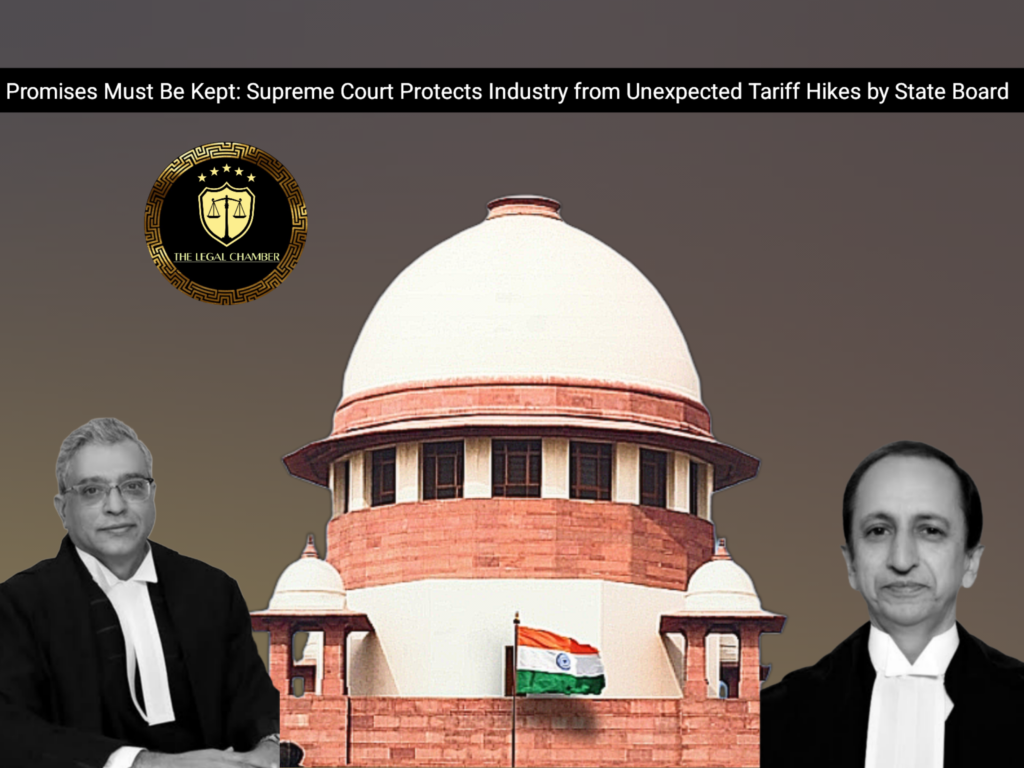The Supreme Court held that the electricity board was estopped from resiling from its contractual obligation to provide a concessional tariff after having sanctioned, agreed, and partially implemented it. The board’s unilateral withdrawal of the concession after over two years was deemed arbitrary, illegal, and unsustainable in law.
Facts Of The Case:
The appellant, an existing industrial unit with a Low Tension (LT) power connection, underwent significant expansion by installing a large induction furnace, which necessitated a High Tension (HT) or bulk power supply. It applied for this new connection in 1998. The respondent electricity board, after inspection, sanctioned the HT connection via a memo that explicitly stipulated the appellant’s eligibility for a 25% concessional tariff on energy charges for three years, conditional upon not availing a separate subsidy for captive power generation. A formal agreement incorporating this concession was executed in January 1999, and the permanent HT connection was effected in July 1999. The board initially granted the concession in its bills for August, September, and November 1999. However, it then demanded certificates to confirm the non-availment of other subsidies. After the appellant complied by submitting two separate certificates, the board abruptly changed its stance, asserting via a November 2000 letter that the appellant was not a “new industry” but merely a converted consumer and was thus ineligible for the concession. This withdrawal of the agreed-upon concession, after years of deliberation and partial implementation, prompted the appellant to file a writ petition.
Procedural History:
The appellant challenged the electricity board’s withdrawal of the concessional tariff by filing a writ petition before the Calcutta High Court. The Single Judge dismissed the petition, relying on a precedent to hold that a conversion from a Low Tension to a High Tension connection did not qualify the unit as a ‘new industry’ eligible for concession. This decision was subsequently confirmed by the Division Bench of the High Court in an appeal. Aggrieved by the affirmation, the appellant then pursued and was granted leave to appeal to the Supreme Court of India, which ultimately heard the civil appeal on its merits.
READ ALSO :Supreme Court’s Big Ruling: Criminal History Matters in Bail for Heinous Crimes
Court Observation:
The Supreme Court observed that the electricity board was legally bound by its own sanctioned memo and the subsequent formal agreement, which explicitly granted the concessional tariff. The Court held the board was estopped from resiling from its contractual obligation and arbitrarily introducing a new eligibility objection years after the agreement was partially performed. It found the board’s conduct in first demanding certificates on one ground and then denying the concession on a completely different, pre-existing ground to be unsustainable and an act of bad faith. The High Court’s orders were set aside for failing to scrutinize this arbitrariness.
Final Decision & Judgement:
The Supreme Court allowed the appeal and set aside the orders of the High Court. The impugned memo dated November 16, 2000, withdrawing the concessional tariff was quashed. The Court held that the appellant was entitled to the 25% concession on the total energy charge for three years as per the agreement dated January 18, 1999. It was noted that the concession had already been implemented during the pendency of the litigation, and thus, the question of a refund did not arise. The parties were directed to bear their own costs.
Case Details:
Case Title: Edcons (MKS) Castings Pvt. Ltd. versus West Bengal State Electricity Board & Ors.
Criminal/Civil Appeal No.: Civil Appeal No. 2592 of 2013
Date of Judgement: August 07, 2025
Judges/Justice Name: Justice Pamidighantam Sri Narasimha and Justice Atul S. Chandurkar
Download The Judgement Here
